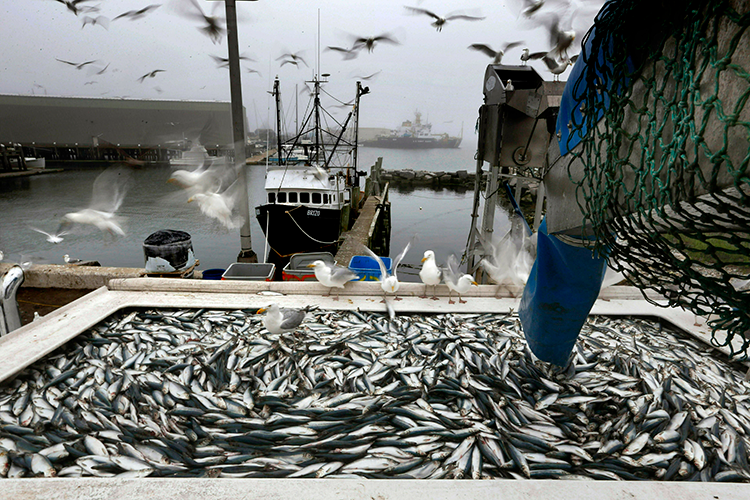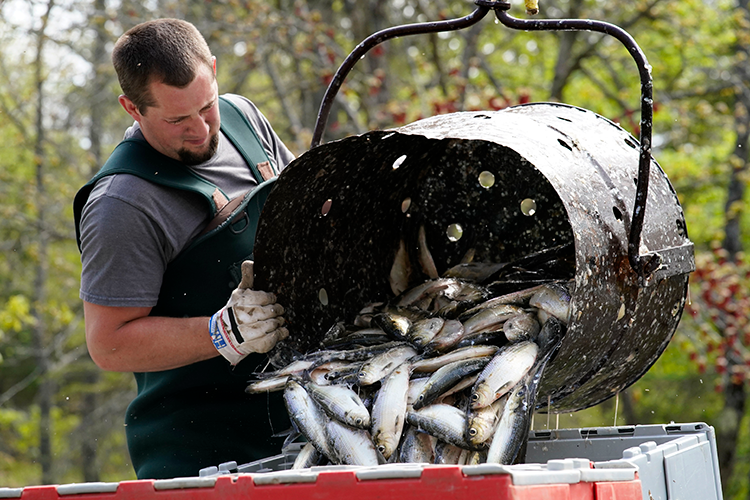Supreme Court will consider overruling landmark Chevron deference decision in a fishy case

A case involving the herring fishing industry could topple a landmark 1984 decision by the U.S. Supreme Court. (AP Photo/Robert F. Bukaty, File)
The U.S. Supreme Court is about to take up one of the biggest cases of the term not involving former President Donald Trump. On Jan. 17, the justices will consider whether they should overrule a landmark 1984 decision often requiring courts to defer to federal agencies’ reasonable interpretations of ambiguous statutes.
The precedent is Chevron USA v. Natural Resources Defense Council, which has been under fire from conservatives and some members of the court for years, and hasn’t been relied on by the Supreme Court itself since at least 2016.
But lower courts still must apply it, and so-called Chevron deference affects vast swaths of the regulated U.S. economy. The two cases up for review involve a relatively small segment of the economy—herring fishing off the Atlantic coast.
When the court granted review in Loper Bright Enterprises v. Raimondo and Relentless Inc. v. Department of Commerce, it made clear in orders that it was only taking up the question of whether Chevron should be overruled or clarified. It did not accept review of the underlying statutory question affecting herring fishing—whether a federal agency correctly interpreted a statute to require fishers to pay the cost of monitors who ride their boats on roughly half of their outings.
“The statutory-interpretation issue is actually pretty fun,” says Christopher J. Walker, a law professor at the University of Michigan and an expert on federal administrative law. “It’s about fishing and whether fishing boats have to pay for monitors on the boat. But it also doesn’t really matter much to the case because the case is squarely presenting the question of should the court overrule Chevron deference, or should it at least accept that some new limitation that silence in the statute does not mean that Chevron deference is available.”
Monitoring for a fish used for bait or, for some, a delicacy
But try telling the fishers and their advocates that the factual underpinning of a case before the Supreme Court doesn’t really matter much.
“The facts and the implications of this case on the herring fishery and the herring fishermen themselves” are important, says Meghan Lapp, the fisheries liaison for Seafreeze, a company that operates two Rhode Island-based fishing boats involved in the case, the F//V Relentless and F/V Persistence. “It matters for every average American citizen—whether the government is allowed to regulate you and hurt you or not. Those things do matter.”
Lapp has spent time out on Seafreeze’s fishing boats which, unlike some others, go out for as long as two weeks at a time to fish for Atlantic herring and other fish. Herring, besides being a pickled delicacy to some, is widely used as bait for lobster and tuna, Lapp says.
The federal Magnuson-Stevens Act of 1976 governs fishing in U.S. waters and is administered by the National Marine Fisheries Service. Congress has provided only limited funding for on-board federal observers, who collect data and ensure compliance on such matters as catch limits.
 Herring fishers are being asked to cover the cost of third-party monitors to accompany them on their ships. (AP Photo/Robert F. Bukaty, File)
Herring fishers are being asked to cover the cost of third-party monitors to accompany them on their ships. (AP Photo/Robert F. Bukaty, File)
The New England Fishery Management Council, a panel overseen by the NMFS, developed a plan in 2013 for the entire Atlantic herring fishery. Under the plan, third-party monitors ride the boats when federal observers are not available. The fishers are responsible for paying the costs of the third-party monitors but not the federally-funded observers. Roughly 50 percent of trips by the herring fishers include an observer or a monitor.
The NMFS approved the New England Council’s rule and issued final regulations for it in 2020.
Herring fishers say they do not oppose observers or monitors on board to ensure compliance, a practice that goes back in one form or another for decades. They object to having to pay the costs of the third-party monitors, about $700 per day.
“Essentially, it is the equivalent of you having to take a policeman, have him in your car to watch you drive to make sure you’re obeying the speed limit, and oh, by the way, you have to pay that policeman out of your own pocket instead of having your taxes pay for the police force,” says Lapp.
Two federal appeals courts apply ‘Chevron’ and uphold rule
The NMFS rule was challenged in two jurisdictions. A group of New Jersey-based herring fishers sued in Washington, D.C., where both the federal district court and the U.S. Court of Appeals for the District of Columbia Circuit upheld the rule under Chevron’s two-step framework.
Under that process, a court reviewing a challenged agency interpretation of a law must assess whether the statutory language was clear, and if so, it must give effect to the clear terms. But if the language is silent or ambiguous, the court is barred from resolving the issue itself and must defer to the agency’s interpretation.
In the Loper Bright case, the D.C. Circuit found in 2022 that the Magnuson-Stevens Act was silent on whether fishers may be required to bear the costs of at-sea monitoring. The court proceeded to step two and found the NMFS’s rule to be reasonable.
In the Relentless case, both a federal district court and the U.S. Court of Appeals for the 1st Circuit, in Boston, also upheld the agency’s rule after applying Chevron analysis.
The Loper Bright litigants reached the Supreme Court first, where they asked the justices to overrule Chevron as well as rule for them on the merits of their dispute under the Magnuson-Stevens Act.
“The problem with Chevron deference at the end of the day is it is almost like an abdication for the judge’s role in interpreting the statute if he think’s there is an ambiguity,” says Ryan P. Mulvey, a counsel with the Cause of Action Institute in Arlington, Virginia, a legal organization that is helping to represent the New Jersey fishers.
The Supreme Court granted review in Loper Bright last May, limited to the question of whether Chevron should be overruled or clarified. But Justice Ketanji Brown Jackson, who had participated in an oral argument in the case while on the D.C. Circuit (but did not rule), recused herself.
The court in October granted review in the Relentless case, again only on the Chevron issue. That will allow Jackson to participate in that case.
John J. Vecchione, senior litigation counsel with the New Civil Liberties Alliance, a legal organization (also based in Arlington, Virginia) that is representing the Rhode Island fishers, says that Chevron has been ineffective and not rooted in the Constitution.
“If judges find ambiguity and get to [Chevron] step 2, the government wins something like 95 percent of time,” he says. “So what you have is a judicially created instrument that compels one litigant to win.”
US says ‘Chevron’ promotes agency expertise and political accountability
U.S. Solicitor General Elizabeth B. Prelogar argues that Chevron is entitled to stare decisis and that overruling it “would be a convulsive shock to the legal system.”
“All three branches of government, regulated parties, and the public have arranged their affairs for decades with Chevron as the backdrop against which Congress legislates, agencies issue rules and orders, and courts resolve disputes about those agency actions,” she wrote in a brief in the Loper Bright case.
Prelogar said Chevron gives appropriate weight to the scientific or technical expertise that federal agencies bring to bear in interpreting federal statutes.
Chevron deference also promotes greater political accountability for regulatory policy, she said. “When a statutory provision is genuinely susceptible of multiple reasonable readings, choosing among those readings often turns on a policy judgment that Congress has vested in the agency and that is properly left to the political branches,” Prelogar said.
Walker, the University of Michigan law professor, said during a Jan. 4 webinar discussing the court’s January cases that he does not think the Supreme Court will accept the constitutional arguments against Chevron and may just end up trying to clarify how lower courts should apply it.
“This isn’t the time or place to overrule a bedrock rule, but I might just be drinking the Kool-Aid on this,” said Walker, who filed an amicus brief in support of neither party that defends Chevron but suggests the federal rule requiring fishers to pay for their monitors may violate the Administrative Procedure Act.
Despite the high court’s limit of the cases to the broader Chevron questions, both set of fishers ask the justices to apply any new standard to monitors rule under the Magnuson-Stevens Act and overrule the federal appeals courts that ruled against them below.
“We think this case is a good vehicle because the facts are clear,” says Vecchione of the New Civil Liberties Alliance. “They don’t need to develop anything more.”
See also:
“Supreme Court could limit agency power after agreeing to reconsider Chevron deference”



